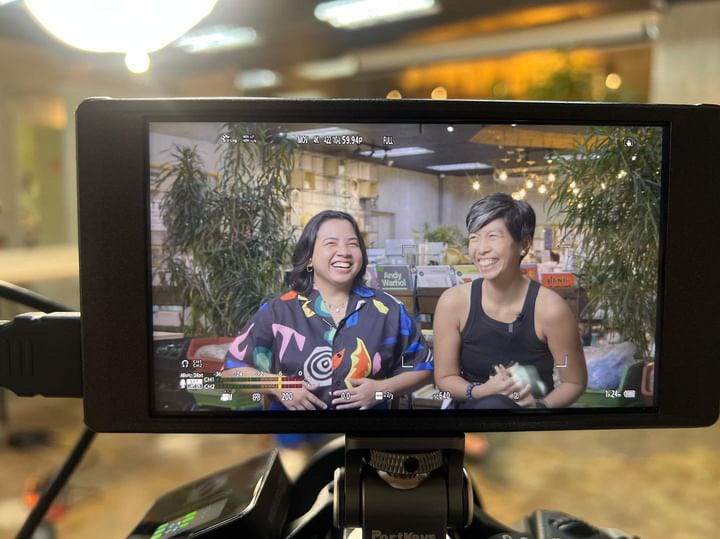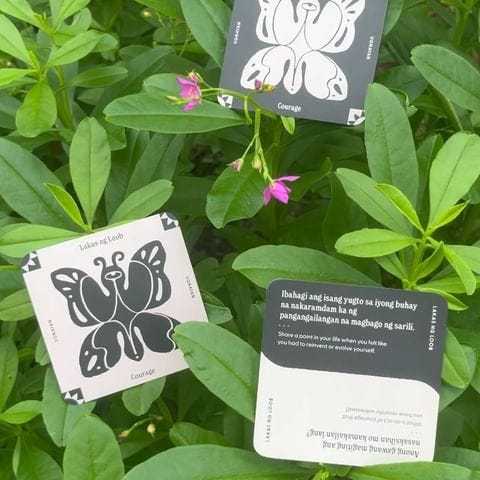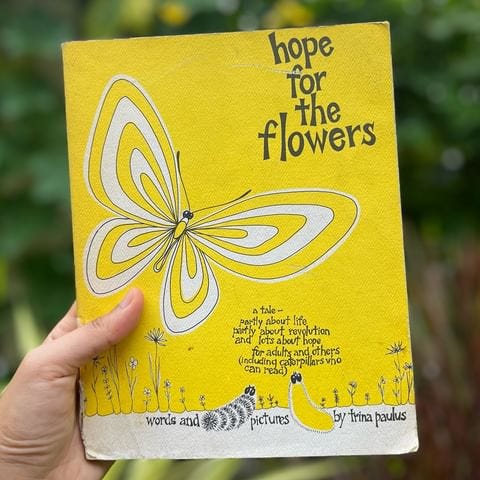Lakas ng Loob: Gathering courage for change
What keeps you in your cocoon? What might recognizing kapwa do for our lakas ng loob?
Hello mga ka-Ugnayan!
Kamusta na? August is coming to an end, and it may already be September by the time you open this letter.
Before this month fully closes, I wanted to share some thoughts about this month’s theme of Lakas ng Loob or Courage: about Lakas ng Loob sa loob at sa labas, Lakas ng Loob in relation to kapwa, bahala na, and pagtataya sa paglikha at sa pakikipag-ugnayan, and Lakas ng Loob sa paglikha at sa pakikipag-ugnayan with our Ugnayan Postcards, and Loob Likha Laya, a community conversation on co-creating cultures of collective care and liberation on September 21.
What has Lakas ng Loob or Courage meant for you in your life recently?
Lakas ng Loob
(Tagalog) tapang; giting
(English) courage; guts; bravado
We might think of Lakas ng Loob or Courage in the face of discomfort and uncertainty as “putting ourselves out there” — public-facing acts of Lakas ng Loob (sa labas), like asking someone out on a date, or coming out to one’s parents or peers; publishing something, launching a new campaign or product, pitching a new project; or organizing community around a cause, fundraising, speaking up about an injustice, taking to the streets, etc.
Lakas ng Loob can also be the courage to shift something inside of us (sa loob) — a feeling or belief we need to confront about our reality — whether “confront” means re-thinking, overcoming, moving through or even accepting that. It could be about learning to say “no”; about choosing wellbeing over society’s conventional definitions of success; about choosing moments of stillness over mindless busy-ness — in order to to transform.
We vacillate between uncertain explorations of a new life and the comfort and familiarity in the cocoon of an old one. When I sit patiently enough with myself though, I recognize that cocooning is not about simply a space to isolate myself from others, but sitting still enough to hear my own thoughts, feel my emotions, and connect with what is real and authentic to me.
And this “me” is not a self that exists in isolation, but a self with kapwa.
We must transform ourselves to transform the world.
- Grace Lee Boggs
Enriquez wrote1:
Lakas ng loob is a damdamin (internal feeling / attribute / trait) necessary for actualizing the good not only in one’s self but also in one’s fellow man (kapwa), in one’s loob, and in facilitating the “social good” in kapwa.
And De Guia also highlighted that2:
Lakas ng loob does not actualize the good in one’s self alone, but awakens also the goodness in others.
Bahala na
I imagine that for a butterfly, unfurling its shriveled wings can feel strange and uncomfortable at first. But the compulsion to fly, to discover the world from one flower to the next, to drink sweet nectar, to carry pollen from plant to plant, to co-create more life-giving gardens…these can compel one to move through the discomfort of change.
“Bahala na!”, we might say, as we leave the known and make taya on the unknown.
This is not from a passivity or lack of intention. Bahala na is not ‘‘fatalism’’ that some of us or our colonizers will label it as, but rather, ‘‘determination and risk-taking’’.3
It is a way that we tell ourselves that we’re submitting to a possibly difficult, definitely uncertain experience up ahead — knowing that we’ve done our best to prepare, and knowing that we’ll do our best to overcome the challenges that may arise.
“Bahala na” can happen in ways big and small. And I’d say that for us at Ugnayan, it happened when we came out with the cards, and it happens with each Ugnayan Tambayan we organize.
May pagtataya sa paglikha. May pagtataya sa pakikipag-ugnayan.
As creators and connectors, we never know how people will respond to the things we put out there — be it new creations or calls for connection.
Our efforts to create and to connect feel vulnerable, and yet, necessary. They feel necessary not only for our own creative compulsions, but largely because it feels like something we’re called to do — to co-create a more connected, just and compassionate world, where people live more mindful, authentically expressed lives with care for their kapwa.
Our Ugnayan Postcards for Connection are a new expression of that. They’re an invitation to connect or re-connect with someone in a different way. Often, people don’t realize that something they did really mattered to us, until we tell them. And we don’t need to wait til it’s their birthday or some special occasion to let them know that something they did or said really mattered to us.
Our next Ugnayan Tambayan, Loob Likha Laya, a community conversation on co-creating cultures of collective care and liberation, is also another expression of that.
It’s happening on September 21, 1-4PM at Common Room at Atrium Makati.
Whether you’re looking for ways to use your creativity more purposefully, seeking fresh perspectives and approaches for your advocacy, or overwhelmed with different issues and unsure of where to start, we hope to have a conversation about using creativity to co-create better futures together.

As I end this Liham ng Ugnayan, I leave you with these questions:
Ano ang isang yugto ng buhay mo na nakaramdam ka ng pangangailangang magbago ng iyong sarili? Ano ang ginawa mo noon? | What is a point in your life when you felt the need to change or evolve yourself? What did you do then?
Para kanino at para saan ka nagiipon ng lakas ng loob ngayon? | Who and what are you mustering courage for at this time?
Hanggang sa susunod na liham o tambayan,
Jen Horn | @pagbubuo
Tagapagpadaloy, Ugnayan Cards
Enriquez, Virgilio. (1992) From Colonial to Liberation Psychology. Quezon City: The University of the Philippines.
De Guia, Katrin. (2005) Kapwa: The Self in the Other. Pasig City: Anvil Publishing.
Lagmay, A.V. (1977) ‘‘Bahala na’’. In L.F. Antonio, L.L. Samson, E.S. Reyes and M.A. Paguio (Eds.), Ulat ng Ikalawang Pambansang Kumperensya sa Sikolohiyang Pilipino (Proceedings of the Second National Conference on Filipino Psychology) (pp. 120–130). Quezon City: Pambansang Samahan sa Sikolohiyang Pilipino.







